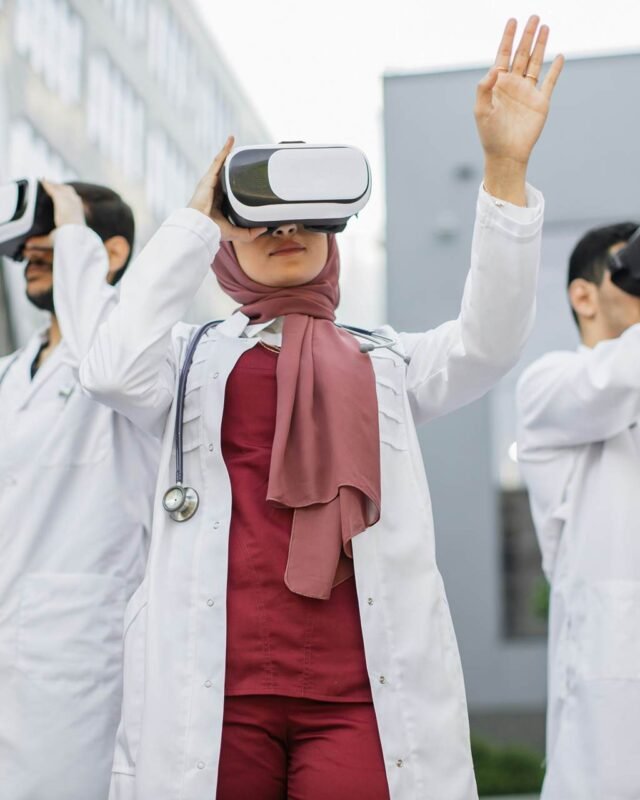The healthcare sector in Saudi Arabia is experiencing a remarkable and transformative journey driven by the widespread adoption of digital health technologies. This digital revolution is poised to revolutionize the nation’s healthcare landscape, bringing about significant improvements in patient care, healthcare outcomes, and the overall efficiency of healthcare delivery. In this article, we delve deeper into the key components of this digital health transformation and its profound impact on Saudi Arabia’s healthcare ecosystem.
Telemedicine: A Leading Force in Saudi Arabia’s Healthcare Evolution
At the forefront of Saudi Arabia’s healthcare digital transformation is the rapid rise of telemedicine. Telemedicine has gained substantial traction, especially in light of the COVID-19 pandemic, as it provides a secure and convenient means for patients to access healthcare services remotely. Virtual consultations, remote monitoring of chronic conditions, and user-friendly telehealth platforms have emerged as integral components of the healthcare landscape. This trend not only enhances patient access to healthcare professionals but also alleviates the strain on physical healthcare facilities.
Electronic Health Records (EHRs): The Foundation of Comprehensive Care
Central to the digital healthcare landscape in Saudi Arabia is the widespread implementation of Electronic Health Records (EHRs). EHRs empower healthcare providers with secure access to comprehensive patient information, streamlining care coordination, and reducing the likelihood of errors. Patients, too, reap the benefits of EHRs as their medical history, diagnostic results, and treatment plans become readily accessible to authorized healthcare professionals, ensuring seamless continuity of care.
Artificial Intelligence (AI): Transforming Diagnostics and Beyond
Artificial Intelligence (AI) has made significant inroads into healthcare diagnostics in Saudi Arabia. AI-driven algorithms are now employed for image analysis, aiding radiologists and pathologists in the more accurate and expedited detection of diseases such as cancer. Moreover, AI is being harnessed for predictive analytics, enabling healthcare providers to identify potential health risks and tailor treatment plans to individual patient needs.
Remote Patient Monitoring: Empowering Patients and Providers
The concept of remote patient monitoring is gaining momentum, particularly for individuals managing chronic diseases. Patients can utilize wearable devices to continuously track vital signs, with data transmitted in real-time to healthcare providers. This proactive approach enables healthcare professionals to intervene promptly in the event of anomalies, ultimately reducing hospital admissions and promoting better patient well-being.
Health Information Exchange (HIE): Fostering Data Interoperability
Saudi Arabia is establishing Health Information Exchange (HIE) platforms to facilitate the secure exchange of patient data among different healthcare organizations. This interoperability enhances seamless care coordination and ensures that healthcare providers have access to comprehensive patient information, even when patients receive care from multiple providers.
Enhancing Patient Engagement: Empowering Individuals
Digital health technologies are empowering patients to take a more active role in managing their health. Mobile health applications and patient portals enable individuals to schedule appointments, access test results, and monitor their health conditions. This heightened patient engagement can lead to improved health outcomes through enhanced adherence to treatment plans.
Regulatory Framework and Data Security: Safeguarding Healthcare Information
The Saudi government is actively developing a robust regulatory framework for digital health to ensure the quality and safety of healthcare services. Paramount in this framework are data security and patient privacy. Stringent measures have been put in place to safeguard sensitive healthcare information, reassuring patients and providers alike.
In conclusion, Saudi Arabia’s digital health transformation represents a paradigm shift in healthcare, leveraging technology to enhance accessibility, quality, and efficiency in the delivery of healthcare services. The adoption of telemedicine, Electronic Health Records, Artificial Intelligence, and patient engagement tools is revolutionizing patient care and positioning Saudi Arabia as a pioneering force in healthcare innovation. As this journey towards a digitally enabled healthcare ecosystem continues, Saudi Arabia stands poised to enjoy the benefits of a more agile, efficient, and patient-centered healthcare system. Embracing digital health is not merely an evolution; it is a revolution that will shape the future of healthcare in the Kingdom of Saudi Arabia.




